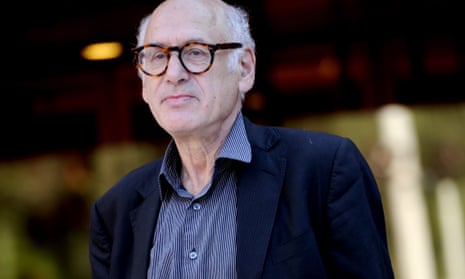Michael Nyman's 70th birthday year is an excuse to enjoy some of the many highlights of his compositions out there on YouTube. Nyman is one of the most misunderstood composers working today, whose work in cinema - especially with director Peter Greenaway but most famously as the composer of the score for Jane Campion's The Piano - tends to obscure the rest of his achievement. For those who know him only through music such as this track from The Draughtsman's Contract, Chasing Sheep is Best Left to Shepherds, with its Purcell-based hi-NRG, or the serene/soporific/instantly-memorable/instantly-annoyingly-catchy theme music for The Piano, now's your chance to delve deeper into Nyman's many soundworlds and the huge range of his output.
And as well as his concert works, chamber music and operas, Nyman's work as a journalist and writer - and latterly, visual artist too - assures him of a unique place in contemporary musical culture. He was the first person to coin the term "minimalism", and he was at the vanguard of what he termed Experimental Music, in a still-seminal tome from the 1970s. That's the point about Nyman: his success in popular terms has its roots not in an attempt to pander to the commercial mores of contemporary culture, but rather in a consistently questioning ethos of experimentation, which refuses to take anything for granted, whether it's the instrumental lineup of a new music ensemble (Nyman's own bands have included rebecs and shawms as well as saxophones and amplified strings, as well as the composer himself on piano), or the notion that to be a "serious" composer you have to eschew the technologies and developments of popular musics. From the outside - or possibly from his own perspective - you might think that Nyman's music has been sidelined by the establishments of contemporary classical music. I'd say rather that his life in music so far has trumped them, by making himself essential to a much wider sphere of influence, exposure, and, in a meaningful sense, accessibility. Nyman is a bona fide experimentalist who just happens to be one of the most widely familiar composers on the planet. Here are five pieces I think you should hear.
For me this is one of Nyman's most ambitious and brilliant pieces, which works both as an explosive showpiece for the Michael Nyman Band and orchestra, and a technical and compositional tour-de-force. Nyman says that "the topography of MGV should be experienced without reference to planning, description or timetables", but there's a subtle interplay between small-scale rhythmic patterns and dislocations, as well as a bigger journey which is articulated by its five inter-connected sections. It's music that's as irresistible in its energy, speed, and sheer noise, as any journey by TGV.
But Nyman's concert music isn't only about celebratory sound and fury. Listen to this quartet, from 1990, for its subtle, meditative reflection.
Based on one of Oliver Sacks's case-studies, Nyman's 1986 opera is one of his most ambitious works, telling the story of Mr P, a professional singer whose visual agnosis means that he can't recognise everyday objects. Nyman's score fuses and fragments Schumann's Lieder into the texture of his own soundworld; the whole piece is a moving, non-narrative work of music-theatre.
Composed for John Harle and Julian Lloyd Webber, who you can hear in this performance, this five-movement concerto is another large-scale instrumental work that fuses Nyman's trademark rhythmic energy with large-scale structural sophistication, and some genuinely lyrical writing for the soloists and orchestra. And somehow he makes the unique - and uniquely challenging! - combination of sax and cello work together.
One of the pieces, originally written in 1977, that defined Nyman's style, a visceral re-working of Leporello's aria from Mozart's Don Giovanni. Here, it's played in a version for brass band by Wingates Band.

Comments (…)
Sign in or create your Guardian account to join the discussion